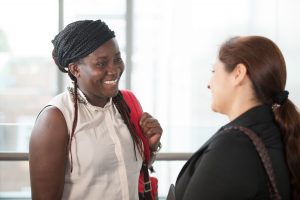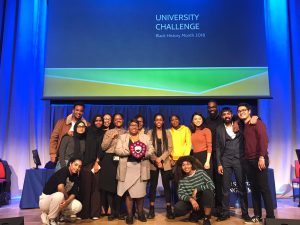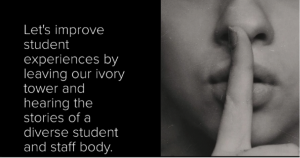In view of the Office for Student (OfS) guidance on submitting access and participation plans to close unexplained attainment gaps for Black and Minority Ethnic (BME) students by 2025, we approached several UK higher education institutions (HEIs) to find out what they were doing about it. Three universities – Kingston, Sheffield Hallam and Birmingham – responded. We spoke to staff in different roles at these HEIs about the attainment gap – those involved in setting institutional policy, those responsible for student-led initiatives, and those engaged in research on the issue – and received a range of responses that reflect the diversity of perspective and approach in the sector. We asked all of them the same four questions and these are their responses.
KINGSTON UNIVERSITY
Are the BME attainment gaps an issue for your institution?
At Kingston, 53% of our students are from black and minority ethnic backgrounds. We have been concerned about the attainment gap between white students and students from BAME backgrounds for several years. This is reflected by the fact that the attainment gap, especially for black students, has been a part of our access plan for many years. Eliminating the attainment gap was a Senior Leadership Team (SLT) key performance indicator in 2014 and became an institutional key performance indicator (KPI) in 2015. Furthermore, the university was looking at attainment differentials before it became an institutional KPI – collecting data and evidence and conducting studies to inform our institutional strategy.

What steps has your institution taken or is taking or planning to take to close them?
We firmly reject the student deficit model and instead adopt a three-pronged approach: improving institutional processes to change the landscape of education at Kingston; enhancing the knowledge and skills of staff through introducing an inclusive curriculum framework and raising awareness; and implementing positive action with students. A high-level steering group was created in 2015 with heads from central units across the university. This was important because these are the people who are the budget-holders and can influence operational direction. We have been enabling conversations between students, academics and professional services so that the issue of differential attainment is addressed at every point of the academic cycle. The value-added score is embedded as an indicator of success and quality in our academic programmes through the course dashboard. We track all our Access-funded initiatives for impact and they are funded accordingly. It is essential that access and attainment initiatives are well resourced and we have funded posts.
But it’s not just about throwing money at the problem – it’s about changing everyday practice, it’s about mobilising staff through a clear evidence base and it’s about a passion and unrelenting commitment to doing the right thing. When we ran workshops with the senior management team, with academic teams and with professional services, we would take them through the student journey, getting them to see how they could affect change. This was powerful. For whole-institution change, you need more than goodwill; the university community needs to be at the table.
With students, we worked hard to raise awareness with course reps, and because it was important to have targeted action as well we introduced programmes such as the Beyond Barriers mentoring schemes.
What do you foresee as your biggest challenge?
There are the perennial problems such as staff turnover and collecting impactful, quality evidence to share with academics; but the key issue we face is to keep the momentum going so that we engage a greater proportion of staff. We feel it’s not yet time to mainstream differential attainment; it needs energy, focus and a long-term view to close it. We need to move beyond the early adopters and build it into Kingston’s DNA.

Have there been any success stories or lessons learned?
We’ve come a long way and there are many successes to celebrate: we see a growing commitment to creating more inclusive curricula in our staff applications for HEA and University Teaching Fellowships reflecting the innovative ways that they are addressing the attainment differentials in their teaching and curriculum; we see how awareness of the issue has become pervasive and we hear conversations about race and attainment at away-days and in informal conversations amongst staff, students, unions. Crucially our attainment gap has moved from 29% in 2012 to 13% in 2018; and we are nearly at a value-added score of 1.0 for our BME students (which represents students achieving their expected degree outcomes given entry qualifications and subject of study). Another big change is how students are being included in these conversations. By bringing the Students’ Union on board, as well as our Student Inclusive Curriculum Consultants, the voices of our diverse student body are being valued and acted on.
Annie Hughes is Head of Academic Staff Development in the Learning and Teaching Enhancement Centre at Kingston University.
Nona McDuff OBE is the Director of Student Achievement at Kingston University. She is also a panel member on the Teaching Excellence Framework (TEF) and the Chair of the Higher Education Race Action Group. Nona has addressed the All Party Parliamentary Group for HE on the importance of systematic approaches to diversifying the academy and was a member of the ministerial Social Mobility Advisory Group.
Owen Beacock is the Student Achievement Manager in the Directorate for Student Achievement at Kingston University.
UNIVERSITY OF BIRMINGHAM
Are the BME attainment gaps an issue for your institution?
The “attainment gap” is an issue for everyone, but it can be argued that it’s more so for universities like Birmingham, which sit within one of the most diverse areas of the country. Some mistakenly attribute the importance of the “attainment gap” to the impact it stands to have on league tables or kite marks such as the Teaching Excellence Framework or Race Equality Charter. Indeed these factors help to prioritise the issue; but the more pressing question, which the attainment gap poses, is about the authenticity of our degree classifications. Unfortunately when framed as the “attainment gap,” the actions of the students are positioned as central to the issue. This can result in a regressive conversation rooted in deficit thinking about how we can best make BME students fit into an academic system which privileges a Eurocentric epistemology. Alternatively the degree-awarding rate leaves more space to question the role of the institutions curriculum, pedagogical and assessment practices.

What steps has your institution taken or is taking or planning to take to close them?
The University of Birmingham is near the start of its journey into tackling this issue. These have been the steps so far:
- Improvements to infrastructure and capacity: As a relatively large institution with more than 30,000 students and 8,000 staff split into five colleges, each with a very different culture, relevant data and accountability is important. We have Tableau data sets that can be analysed at college level to inform local actions, and we have also improved the registration process to enable more accurate data to be collected about the student population. There has been a number of new staff posts created in the last 12-18 months, which specifically address equalities issues. The Deputy Pro-Vice-Chancellor, Equalities and Pro-Vice-Chancellor for Education, both lead on this work at a senior level.
- Inclusion of student voice: The university is truly blessed with the insight that it can gain from its incredibly well-informed students. The BME Student Ambassador programme has inspired our current OfS-funded partnership with the University of Manchester and Manchester Metropolitan University. Our current Diversity and Inclusion student ambassadors are given equalities training and form an integral part of the process of identifying and addressing issues. An example of this is the student’s involvement in the development of staff training alongside race equality specialists Brap
- The Race Equality Charter mark: The University of Birmingham is preparing its first submission to the Race Equality Charter Mark. The process of applying has given a robust framework with which to investigate the contemporary lived experience of both, BME staff and students. It has also helped focus an institution-level response to the issues raised within the data.

What do you foresee as your biggest challenge?
It’s relatively easy to make a moral, business and legal case for addressing this issue; unfortunately a stick sometimes needs to accompany those carrots, which requires buy-in from well-informed senior leadership. Aside from ensuring that the right projects are commissioned and continuity and stability are achieved, it enables institutions to take a stand on issues of social justice and decolonisation, which are invariably intertwined with this issue. This is not a quick fix; many cases will require radical change. Only senior leaders can send a message about how important this work is and commit to it.
Have there been any success stories or lessons learned?
The student ambassador programme has gone from strength to strength and has been recognised by Universities UK as well as a valid action to addressing this issue. This will hopefully mean that the project will then be continued once the OfS funding ends. The option of including the programme within the access and participation plan is currently being explored.
Alex Mormoris is Equality and Diversity Officer for Students in Academic Services at the University of Birmingham and manages the Equality & Diversity ambassador programme.
SHEFFIELD HALLAM UNIVERSITY
Are the BME attainment gaps an issue for your institution?
In 2015, the Student Engagement Evaluation and Research (STEER) directorate was established. STEER captures evidence of impact of change and processes which enable/disable change, including both intended and unintended consequences. We work to provide a supportive environment so that we can move beyond attainment data per se towards a mandate for action. One of our first tasks was to provide an evidence base and critique of differential student outcomes, with specific focus on BAME attainment. This included a meta-review of our initiatives over the last three years, five years of sector literature, and analysis of successful Race Equality Charter submissions. The degree awarding gap between white and BAME (Black, Asian and Minority Ethnic) UK-domiciled students then stood at 18%.
Our evidence-informed approach led us to reject assumptions concerning student deficit, and to promote a model of structural change which focused on appreciative inquiry and social justice. Our formative learning emerged from work with the REACT initiative, Creation and Confidence: BME students as academic partners. This institutional project aimed to provide evidence-based insights into use of co-design processes and peer-assisted learning as possible conduits of confidence-building and belonging of BAME students.
What steps has your institution taken or is taking or planning to take to close them?
Our REACT project struggled to secure course level buy-in for our approaches. Was the institution ready for the large and small-scale change needed to reduce this gap? We now recognise that the institution was in the pre-contemplation stage of change (Prochaska and DiClemente 1983); space was needed to think critically about our policies, behaviours, culture and even about unlearning practices.

The focus of our work at STEER thereafter has been on awareness-raising and challenging sameness whilst creating vehicles for having difficult conversations. In 2018, we were funded by the Leadership Foundation in Higher Education to explore the use of digital storytelling as an intervention for facilitating positive cultural and behavioural change. The focus was on ‘critical Whiteness’ within organisational development and concluded that”in order to move towards positive cultural and behavioural change there must be a consideration of levels ofcomfort and neutralisation within the intended audience, the leading project team, and the wider organisation” (Austen and Jones-Devitt 2018, p.7). We have also extended the debate around sameness and privilege to notions of zombie leadership.
In April 2019 we ran a workshop in which we distributed copies of Why I’m No Longer Talking To White People About Race by Reni Eddo-Lodge. Readers, as research participants, were asked to read the book and offer reflections at a ‘pedagogic insights lunch’ to discuss thoughts and possible actions.

What do you foresee as your biggest challenge?
STEER has made progress in the last few years to assess institutional readiness (Jones-Devitt et al, 2017) and to move beyond pre-contemplation.Our directorate has a strategic commitment to support positive student experiences for all and we continue to work to develop evaluative mind-sets through capacity-building, enabling resources at the micro and meso-level, and in building trusting relationships across the institution.
Have there been any success stories or lessons learned?
As ethical researchers, we have actively reported our less successful initiatives as ‘lessons learnt.’ Colleagues internally and externally have sought our views on this basis. We hope we have subsequently earned a measure of credibility and trust. The engagement and response from the institution has consequently grown. When we now seek participants for our research and projects, engagement is noticeably wider and more diverse.
Liz Austen is a Senior Lecturer in Research, Evaluation and Student Engagement at STEER at Sheffield Hallam University.
Stella Jones-Devitt is Head of Student Research and Evaluation at Sheffield Hallam University.
The LSE Higher Education Blog would like to thank all the contributors who made the time to speak about how their respective institutions are approaching these issues despite their busy schedules and looming deadlines for the APP submissions.
Disclaimer: This post is opinion-based and does not reflect the views of the London School of Economics and Political Science or any of its constituent departments and divisions.
Note: This post was amended on 14 May to correct Nona McDuff’s postnominals from CBE to OBE





